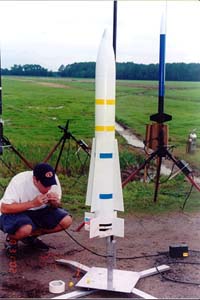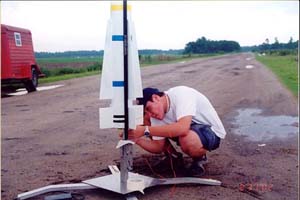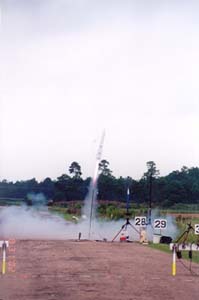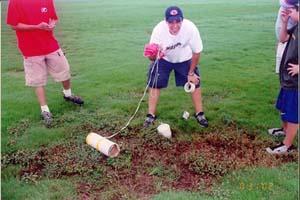| Manufacturer: | Blackhawk R&D |

(Contributed - by Marcus Harmon, Pics provided by Bob Schoner - 10/20/02)
 Brief:
Brief:
This is a Blackhawk R&D 5.5" semi-custom Phoenix. The original Phoenix
had a single 54mm motor mount, and I had it changed to (5) 38mm motor mounts.
The people at Blackhawk were great to work with and they produced a superb kit.
Construction:
The kit came with (1) 5.5" kraft paper airframe tube, (1) 5.5" kraft
paper payload section, (1) tube coupler, (5) 38mm motor tubes, (3) plywood
centering rings, (1) plywood bulkhead, recovery attachment hardware, (1)
tubular nylon shock cord, (1) set of 8 plywood fins, and (1) 5.5" plastic
nose cone. To save money, I supplied the recovery parachutes myself. Also, the
airframe was pre-slotted, and everything arrived in perfect condition.
Because this was a high power kit, there were no instructions supplied with it (as with all of Blackhawk's larger kits) This allows you to construct it the way you want, and not have to follow exact instructions.
This kit has standard, straightforward construction except for the eight fins, and it went together perfectly aside from a couple of (and expected) tight fits with the motor mount. I used a new gluing technique with this bird, also. I mixed Great Plains milled fiberglass (fiberglass dust) into my epoxy. This greatly improved its strength and drying time.
 The rocket was assembled primarily with
Devcon 2-ton (2 hr.) epoxy mixed with fiberglass dust. I also used some 5
minute Devcon and glass dust in some small spots, some Hobby Poxy and glass
dust on parts of the motor mount, and I also used a few other interesting
adhesives with the fins. For the aft set of fins, I attached them with 2-ton
Devcon and glass dust, and I glassed the fin/airframe joints with 5-minute
epoxy and heavy glass (sorry...I can't remember it's weight). For the forward
fins I used Devcon 2-ton with glass dust, then a fillet layer of Elmers
Pro-Bond wood glue and fiberglass dust, and finally I filleted the fins with JB
Weld mixed with glass dust. This provided a bond that was surprisingly firmer
and stronger than the glassed and 2-ton epoxied aft fins. I also glassed the
joint of the top centering ring and the airframe with Hobby Poxy.
The rocket was assembled primarily with
Devcon 2-ton (2 hr.) epoxy mixed with fiberglass dust. I also used some 5
minute Devcon and glass dust in some small spots, some Hobby Poxy and glass
dust on parts of the motor mount, and I also used a few other interesting
adhesives with the fins. For the aft set of fins, I attached them with 2-ton
Devcon and glass dust, and I glassed the fin/airframe joints with 5-minute
epoxy and heavy glass (sorry...I can't remember it's weight). For the forward
fins I used Devcon 2-ton with glass dust, then a fillet layer of Elmers
Pro-Bond wood glue and fiberglass dust, and finally I filleted the fins with JB
Weld mixed with glass dust. This provided a bond that was surprisingly firmer
and stronger than the glassed and 2-ton epoxied aft fins. I also glassed the
joint of the top centering ring and the airframe with Hobby Poxy.
Next I put a strip of glass around the top of the booster airframe to prevent it from fraying (I had sanded it quite a bit and that caused the end of the tube to fray). Because of its heavy motor mount and many fins, this rocket needed some nose weight. Well, I got a little happy with it and put in around *9 LBS* of sand in the nose. (hey, it doesn't hurt to be on the safe side!) For recovery I used (2) 36" 'chutes on the booster, and borrowed a 60" for the ridiculously heavy payload section. Lastly, I replaced the 1/2" lug with rail guides that were attached at the launch with the help of John Gordon (thanx John!). I also used four wood screws with washers on them for motor retention, and two Kevlar® 'chute protectors.
 Finishing:
Finishing:
I filled the body with bondo, and then I sanded, and sanded, and sanded, and
sanded some more. Then I primed and sanded and primed and sanded. Next I
painted the body with Rustoleum white and white Appliance Epoxy. I then masked
it and painted on some blue and yellow semi-scale markings, and I painted the
tip of the nose silver. Finally, I gave it a few coats of clear polyurethane.
Construction Rating: 5 out of 5
Flight:
I was planning on flying this at the Tripoli SC Freedom launch on a full load
(4 Pro38 G60's, and one Pro38 J330) with Andy from Blackhawk R&D being my
flight sponsor (I'm under 18). BUT, the Pro38 J didn't materialize, and the
weather for the only day I was at the launch was totally crappy. There was a
low ceiling, and it drizzled off and on for much of the day. But by around 3:00
the ceiling had raised enough to fly. So, I talked with my Prefect and we came
up with (1)I435T, and (2)G60's. It wouldn't be any more than 1000ft altitude,
but it would be loud and fiery (and that would make up for the altitude). Well
now we couldn't locate his 38/600 case, or find anything to plug the empty
motor tubes with! But Tom Binford graciously offered his 38/600 case and two
38/240 cases to plug the empty motor holes with (thanx Tom!!). Then we
assembled the motors, signed the flight card, and headed for the pads. I used
Blacksky Hi-RMI mini matches for ignition of the Pro38 G60's (with their
blackpowder ignition pellet that's all you need), and I got a small piece of
thermalite to tape on to the the Hi-RMI mini match for the I435T. Finally it
was time...5...4...3...2...1...Ignition! The two G60's lit before the LCO
finished saying "ignition" and the I435 hit near the end of the rail
with a tremendous roar and blue flame. After everything burned out, the rocket
was literally whistling, and with it's weight, it quickly reached apogee and
started back down.
 Recovery:
Recovery:
I was using ejection from the two G60's. Their delay was set for 5 seconds.
They ran a bit long but not long enough to hurt anything, and the rocket hit
apogee and headed down a bit, and then the ejection charges fired and separated
everything. The two 36" booster 'chutes deployed fine, but the 60"
payload section 'chute was wrapped too tightly (oops), and it never deployed.
The 10lb. payload section came in hot. Thank goodness it went over the crowd
and out into the middle of the field. The impact of this thing was so intense
that it shoved the epoxied tube coupler almost all the way up into the payload
section, and the nose was pretty well buried. But with some strength, the nose
was removed, and what a hole it left! Thankfully, the sand kept the nose
shape...it just needs to be cleaned and repainted. Unfortunately, the payload
tube was slightly crimped so I will have to replace that. But really, that was
the only damage to the vehicle except for the loss of paint on the nose.
Flight Rating: 3 out of 5
Summary:
This is one great kit. Blackhawk was easy to work with, and they did a great
job. I can identify absolutely no problems with it...except the ones I caused!
All I want to say is that I highly recommend Blackhawk for good quality, WELL
PRICED custom work, and for great kits. Building this was a great
experience...I can't wait to fly it on a full load! (1)I435T, (2)I300T, and
(2)H242T here we come!
Overall Rating: 5 out of 5
Sponsored Ads
 |
 |










